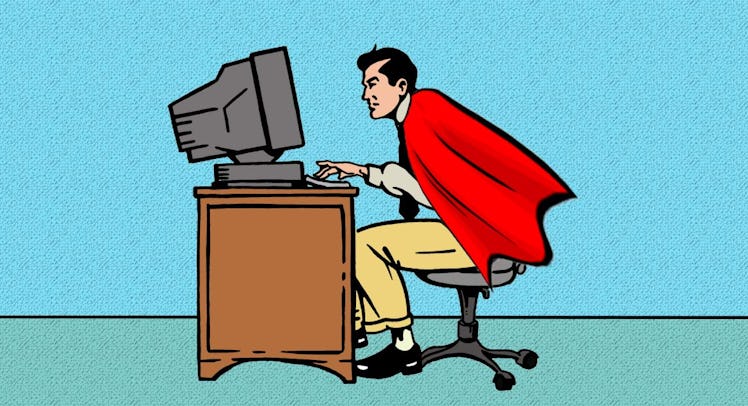My 5-Year-Old Thinks My Work-Life Balance Sucks
I discovered my kids knows a lot more about me than I thought, including that I may have problems with keeping an eye on my work-life balance.

During a rare event for fathers at my son’s preschool, I was presented with a few precious gifts. One was a painted clay bowl for my desk (assuredly not an ashtray). The other was a cardboard tie, painted by my son, that I could wear around my neck with the attached string. On the back of the tie were a series of facts about me, as gleaned from the kid, Mad-Libs style. By and large, these facts were adorable, but one, in particular, broke my heart and made me wonder if I was really being the father I wanted to be.
On the adorable end, it was amazing to know how observant my 5-year-old is. Yes, in fact, I do like to wear caps. I do “love to eat coffee.” I do always laugh when I play with him. But, asked to complete the sentence, “His superpower is…,” my son chose “working.” That did not make me feel awesome.
Why did my superpower have to be “working?” Why didn’t he pick “love” or “playing music” or “building Legos”? The lyrics of Harry Chapin’s tear-jerker fatherhood folk tune “Cats in the Cradle” began to play in my mind: “When you comin’ home, dad? / I don’t know when / But we’ll get together then, son / You know we’ll have a good time then.”
But I know why my kid’s answer was working. That’s the bulk of his experience with me. It has been since he was a baby. Before he could walk, I got a job in Ohio and lived there without my family to establish our home. After my wife and kid moved in, I was in the office before he woke up and home after he’d already gone to bed. My next job included an hour and a half commute which also cut our time together. I’d arrive home having left the bulk of my energy in the office and on the highway. I had very little to give to my family.
Now, I work from home. I see my boy more often, but my office door is usually shut between us. For the bulk of the day, I’m physically close but emotionally distant. My son has a habit of knocking on the door.
“Poppa, can you build Legos with me?” he’ll ask in his sweet little voice.
“I can’t right now, buddy. I have to work,” is my usual reply.
Of course, when I take a deep breath, I can take the perspective that at least they have a father who is giving them a strong work ethic. The bright side is that they will not grow up thinking the world provides for them easily and effortlessly. They see how I throw myself into my work and they understand what having meaningful work means to me.
My kid isn’t dumb. He knows that a superpower is an ability that defines the hero. It’s what gives the hero power. And if I think about it like that, getting power through work isn’t so bad. At least I’m not the father of one of his classmates whose superpower was “spanking butts” or the guy I talked with over donuts whose kid couldn’t come up with anything.
Look, I’m proud that I can be the provider for my family. I feel very good about the fact that my efforts have put a roof over the head of my wife and children. I’m thankful that my work ensures we are comfortable and safe. But I also struggle with the idea of wanting to be there for my family as much as possible and share in their lives. I recognize that holding the desire to be a provider in opposition to the desire to be an accessible dad is also a uniquely modern conundrum.
My grandfather probably didn’t feel the same struggle. In fact, in order for his family to be housed and fed, he left his wife and five children to work halfway across the state at a sawmill for months at a time. Colorado mountain passes and unreliable slow transportation kept him from his wife and kids. Sure, he missed them. That much is true from his achingly sweet love letters home. But even miles away, he didn’t despair. His work was just a hard fact. Something a man had to do. It wasn’t a superpower, it was a reality.
So maybe, as time has passed between our generations, working has indeed become a superpower. Better yet, working stoically with the understanding that what I’m doing is good for the people I love most. I think I can own that and know that in the grand scheme of things, I do have the opportunity to walk out the office and see my family, a miracle that my grandfather could not have contemplated.
So I’m going to wear the garish cardboard tie my son gave me. Because some heroes don’t wear capes.
This article was originally published on